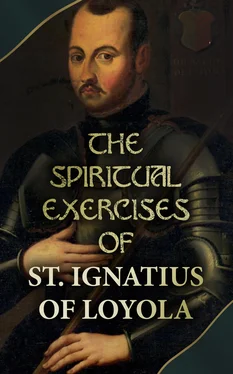Fifth Annotation. The fifth: It is very helpful to him who is receiving the Exercises to enter into them with great courage and generosity towards his Creator and Lord, offering 2Him all his will and liberty, that His Divine Majesty may make use of his person and of all he has according 3to His most Holy Will.
Sixth Annotation. The sixth: When he who is giving the Exercises sees that no spiritual movements, such as consolations or desolations, come to the soul of him who is exercising himself, and that he is not moved by different spirits, he ought to inquire carefully of him about the Exercises, whether he does them at their appointed times, and how. So too of the Additions, whether he observes them with diligence. Let him ask in detail about each of these things.
Consolation and desolation are spoken of on p. 170; the Additions on p. 22.
Seventh Annotation. The seventh: If he who is giving the Exercises sees that he who is receiving them is in desolation and tempted, let him not be hard or dissatisfied with him, but gentle and indulgent, giving him courage and strength for the future, and laying bare to him the wiles of the enemy of human nature, and getting him to prepare and dispose himself for the consolation coming.
Eighth Annotation. The eighth: If he who is giving the Exercises sees that he who is receiving them is in need of instruction about the desolations and wiles of the enemy—and the same of consolations—he may explain to him, as far as he needs them, the Rules of the First and Second Weeks for recognising different spirits. (P. 177).
Ninth Annotation. The ninth is to notice, when he who is exercising himself is in the Exercises of the First Week, if he is a person who has not been versed in spiritual things, and is tempted grossly and openly—having, for example, suggested to him obstacles to going on in the service of God our Lord, such as labors, shame and fear for the honor of the world—let him who is giving the Exercises not explain to him the Rules of the Second Week for the discernment of spirits. Because, as much as those of the First Week will be helpful, those of the Second will be harmful to him, as being matter too subtle and too high for him to understand.
Tenth Annotation. The tenth: When he who is giving the Exercises perceives that he who is receiving them is assaulted and tempted under the appearance of good, then it is proper to instruct him about the Rules of the Second Week already mentioned. For, ordinarily, the enemy of human nature tempts under the appearance of good rather when the person is exercising himself in the Illuminative Life, which corresponds to the Exercises of the Second Week, and not so much in the Purgative Life, which corresponds to those of the First.
Eleventh Annotation. The eleventh: It is helpful to him who is receiving the Exercises in the First Week, not to know anything of what he is to do in the Second, but so to labor in the First to attain the object he is seeking as if he did not hope to find in the Second any good.
Twelfth Annotation. The twelfth: As he who is receiving the Exercises is to give an hour to each of the five Exercises or Contemplations which will be made every day, he who is giving the Exercises has to warn him carefully to always see that his soul remains content in the consciousness of having been a full hour in the Exercise, and rather more than less. For the enemy is not a little used to try and make one cut short the hour of such contemplation, meditation or prayer.
Thirteenth Annotation. The thirteenth: It is likewise to be remarked that, as, in the time of consolation, it is easy and not irksome to be in contemplation the full hour, so it is very hard in the time of desolation to fill it out. For this reason, the person who is exercising himself, in order to act against the desolation and conquer the temptations, ought always to stay somewhat more than the full hour; so as to accustom himself not only to resist the adversary, but even to overthrow him.
Fourteenth Annotation. The fourteenth: If he who is giving the Exercises sees that he who is receiving them is going on in consolation and with much fervor, he ought to warn him not to make any inconsiderate and hasty promise or vow: and the more light of character he knows him to be, the more he ought to warn and admonish him. For, though one may justly influence another to embrace the religious life, in which he is understood to make vows of obedience, poverty and chastity, and, although a good work done under vow is more meritorious than one done without it, one should carefully consider the circumstances and personal qualities of the individual and how much help or hindrance he is likely to find in fulfilling the thing he would want to promise.
Fifteenth Annotation. The fifteenth: He who is giving the Exercises ought not to influence him who is receiving them more to poverty or to a promise, than to their opposites, nor more to one state or way of life than to another. For though, outside the Exercises, we can lawfully and with merit influence every one who is probably fit to choose continence, virginity, the religious life and all manner of evangelical perfection, still in the Spiritual Exercises, when seeking the Divine Will, it is more fitting and much better, that the Creator and Lord Himself should communicate Himself to His devout soul, inflaming it with His love and praise, and disposing it for the way in which it will be better able to serve Him in future. So, he who is giving the Exercises should not turn or incline to one side or the other, but standing in the centre like a balance, leave the Creator to act immediately with the creature, and the creature with its Creator and Lord.
Sixteenth Annotation. The sixteenth: For this—namely, that the Creator and Lord may work more surely in His creature—it is very expedient, if it happens that the soul is attached or inclined to a thing inordinately, that one should move himself, putting forth all his strength, to come to the contrary of what he is wrongly drawn to. Thus if he inclines to seeking and possessing an office or benefice, not for the honor and glory of God our Lord, nor for the spiritual well-being of souls, but for his own temporal advantage and interests, he ought to excite his feelings to the contrary, being instant in prayers and other spiritual exercises, and asking God our Lord for the contrary, namely, not to want such office or benefice, or any other thing, unless His Divine Majesty, putting his desires in order, change his first inclination for him, so that the motive for desiring or having one thing or another be only the service, honor, and glory of His Divine Majesty.
Seventeenth Annotation. The seventeenth: It is very helpful that he who is giving the Exercises, without wanting to ask or know from him who is receiving them his personal thoughts or sins, should be faithfully informed of the various movements and thoughts which the different spirits put in him. For, according as is more or less useful for him, he can give him some spiritual Exercises suited and adapted to the need of such a soul so acted upon.
Eighteenth Annotation. The eighteenth: The Spiritual Exercises have to be adapted to the dispositions of the persons who wish to receive them, that is, to their age, education or ability, in order not to give to one who is uneducated or of little intelligence things he cannot easily bear and profit by.
Again, that should be given to each one by which, according to his wish to dispose himself, he may be better able to help himself and to profit.
So, to him who wants help to be instructed and to come to a certain degree of contentment of soul, can be given the Particular Examen, p. 21, and then the General Examen, p. 25; also, for a half hour in the morning, the Method of Prayer on the Commandments, the Deadly Sins, etc., p. 125. Let him be recommended, also, to confess his sins every eight days, and, if he can, to receive the Blessed Sacrament every fifteen days, and better, if he be so moved, every eight. This way is more proper for illiterate or less educated persons. Let each of the Commandments be explained to them; and so of the Deadly Sins, Precepts of the Church, Five Senses, and Works of Mercy.
Читать дальше











